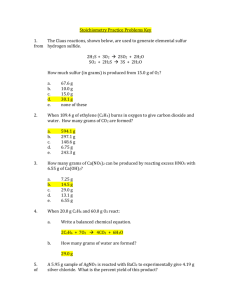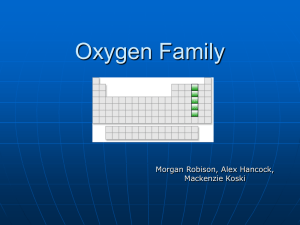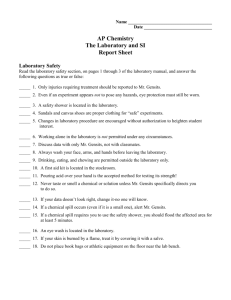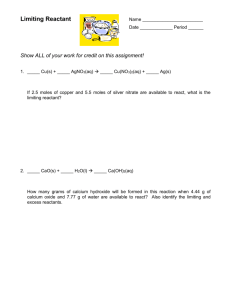File
advertisement
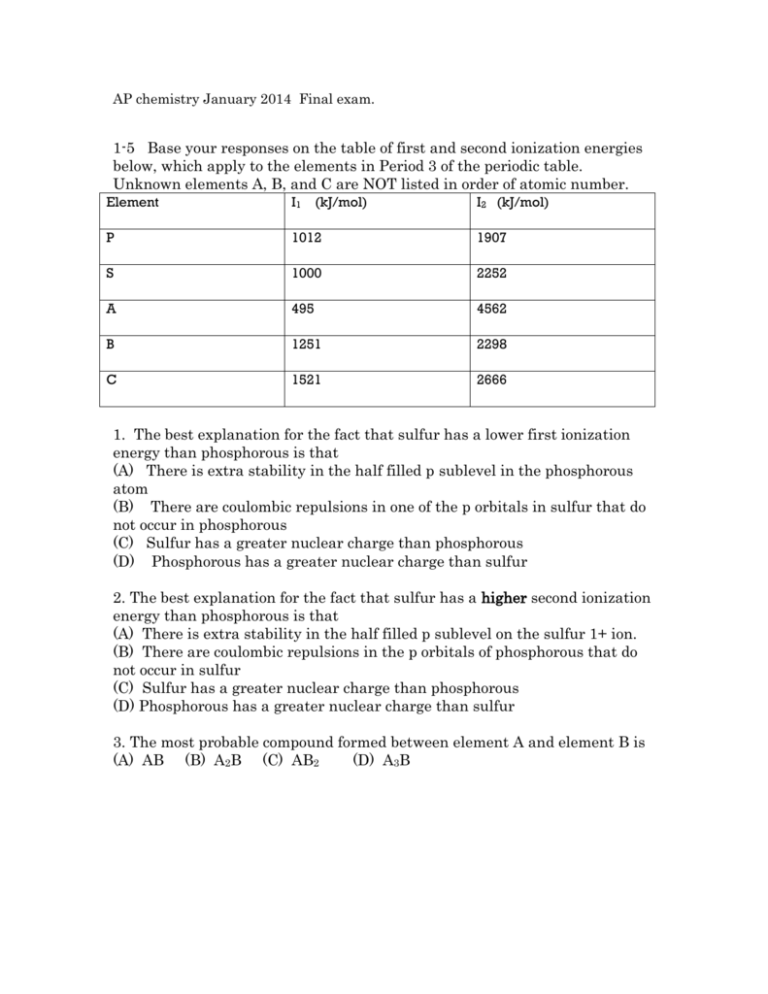
AP chemistry January 2014 Final exam. 1-5 Base your responses on the table of first and second ionization energies below, which apply to the elements in Period 3 of the periodic table. Unknown elements A, B, and C are NOT listed in order of atomic number. Element I1 (kJ/mol) I2 (kJ/mol) P 1012 1907 S 1000 2252 A 495 4562 B 1251 2298 C 1521 2666 1. The best explanation for the fact that sulfur has a lower first ionization energy than phosphorous is that (A) There is extra stability in the half filled p sublevel in the phosphorous atom (B) There are coulombic repulsions in one of the p orbitals in sulfur that do not occur in phosphorous (C) Sulfur has a greater nuclear charge than phosphorous (D) Phosphorous has a greater nuclear charge than sulfur 2. The best explanation for the fact that sulfur has a higher second ionization energy than phosphorous is that (A) There is extra stability in the half filled p sublevel on the sulfur 1+ ion. (B) There are coulombic repulsions in the p orbitals of phosphorous that do not occur in sulfur (C) Sulfur has a greater nuclear charge than phosphorous (D) Phosphorous has a greater nuclear charge than sulfur 3. The most probable compound formed between element A and element B is (A) AB (B) A2B (C) AB2 (D) A3B The photoelectron spectrum (PES) of one of the period 3 elements is sketched below: 4. Which element is most likely to have produced this spectrum? (A) Mg (B) Al (C) Si (D) P 5. Selenium, Se, is located directly below sulfur on the periodic table. How would data for selenium compare with that of sulfur? (A) The first ionization energy of selenium would be lower than that of sulfur and the PES of selenium would have three additional peaks. (B) The first ionization energy of selenium would be higher than that of sulfur and the PES of selenium would have three additional peaks. (C) The first ionization energy of selenium would be lower than that of sulfur and the PES of selenium would have two additional peaks. (D) The first ionization energy of selenium would be higher than that of sulfur and the PES of selenium would have two additional peaks. 6. How many unpaired electrons are there on a ground state Co3+ ion? A) 2 B) 3 C) 4 D) 5 7. If an element has the electron configuration 2-8-13-1, how many of the electrons are in the 3 d sublevel? A) 4 B) 5 C) 6 D) 13 8. The amount of heat that will cause a sample of water to become 1 degree warmer, will cause the same mass of lead to become 30 degrees warmer. The best conclusion that can be drawn from this information is that A) the specific heat of lead is 30 times greater than that of water B) the specific heat of water is 30 times greater than that of lead C) lead is 30 times denser than water D) the molar mass of lead is 30 times the molar mass of water 9-10 A student is given four bottles, each containing one of the following four liquids: 1. Ethanol, C2H5OH 2. dimethyl ether, CH3OCH3 3. carbon tetrachloride, CCl4 4. propanone, CH3COCH3 The student wishes to identify each liquid, based on its physical properties. 9. A few drops of each liquid are added to separate test tubes containing some water. Which of the four liquids can be identified based on this experiment? A) ethanol B) dimethyl ether C) carbon tetrachloride D) propanone 10. The student tests the boiling point of each liquid and finds that ethanol has the highest normal boiling point of the four . This is due to the fact that A) ethanol has stronger London dispersion forces than the other liquids B) ethanol has weaker London dispersion forces than the other liquids C) ethanol is the only liquid of the four that shows hydrogen bonding between its molecules D) ethanol is the only liquid of the four that is a dipole 11-12. The first ionization energy of sulfur is 1000 kJ/mol. 11.Which of the following reactions most accurately illustrate the meaning of this ionization energy? (I.E.) A) S(s) + I.E. ➞ S+(g) + eB) S(g) + I.E. ➞ S+(g) + e– C) S(g) + e– ➞S– + I.E. D) S(s) ➞ S+(g) + e- + I.E. 12. In a plot of the P.E.S. of sulfur, the peak that appears at 1.0 MJ (megajoules)/mol would be A) the lowest peak at the lowest energy. B) the highest peak, at the highest energy C) the lowest peak at the highest energy D) the highest peak at the lowest energy. 13. Which molecule or ion shows sp hybridization on a carbon atom? A) HCN B) CO32– C) HCHO D) C2H6 14. In which molecule or ion is the electron geometry on the central atom trigonal bipyramidal? A) SF6 B) ICl5 C) SF4 D) NO3- 15 to 18. The density of a solid object is often found by determining its mass, and then adding it to a measured volume of water to determine its volume. The data for such an experiment are: Mass of metal object: 32.40 grams Volume of water: 31.4 mL Volume of water + object 35.4 mL 15. The density of the object, expressed to the correct number of significant figures is A) 8 g/mL B) 8.1 g/mL C) 8.0 g/mL D) 8.10 g/mL 16. Which two physical properties of the solid are most important in making this method of determining density feasible? The object should be A) of a regular shape, and have a smooth surface B) denser than water, and insoluble in water C) insoluble in water, and have a regular shape D) soluble in water, and have a smooth surface 17. The experiment is repeated with aluminum, which is only one third as dense as the object in the first experiment. If 32.40 grams of aluminum are added to the same 31.4 mL of water, what will be the final total volume? A) 32.7 mL B) 35.4 mL C) 43.4 mL D) 106 mL 18. In the determination of the density of aluminum by this method, with the same equipment as in the data above, the number of significant figures in the determined density would be A) the same as in the first experiment, since the same equipment was used B) fewer than in the first experiment, because the density of the Al is smaller. C) greater than in the first experiment, because of the larger volume of the aluminum sample D) the same as in the first experiment because both objects are metals 21. Which of the following ions has the same number of electrons as Se2 ? (A) K+ (B) S2 (C) Y3+ (D) I 22. In solid methane, CH4. the forces between neighboring molecules are best described as (A) ionic bonds (B) covalent bonds (C) hydrogen bonds (D) London (dispersion) forces 23. A compound contains 46 % sulfur and 54 % fluorine by mass. The empirical formula of the compound is (A) SF (B) SF2 (C) S2F (D) SF4 24. If 0.80 mol of H2 and 0.30 mol of O2 were to react as completely as possible to produce H2O, what mass of reactant would remain? (A) 0.20 grams of H2 (B) 0.40 grams of H2 (C) 1.00 grams of H2 (D) 4.0 grams of O2 substance A B C D melting point 2600̊C 146̊C electrical conductivity in solid state non conductor non conductor non conductor excellent electrical conductivity in water insoluble nonelectrolyte strong electrolyte insoluble 334̊C 419̊ C 25. Based on the physical properties listed above, which of these substances might be glucose? A)A B)B C)C D)D 26. Which of these substances might be an ionic solid? A)A B)B C)C D) D 27. Substance A is likely to be the same type of solid as A) iodine B) dry ice C) diamond D) tungsten 28. ___Ca3(PO4)2 + ___ H3PO4 ____Ca(H2PO4)2 When the equation above is balanced using the smallest possible whole number coefficients, what is the coefficient for H3PO4 ? (A) 6 ( B) 2 (C) 3 (D) 4 29. Which represents an atom in an excited state? (A) 1s22s22p4 (B) 1s22s22p63s23p1 (C) 1s22s22p43s2 (D) 1s22s22p63s23p5 30. How many carbon atoms are there in 4.4 grams of C3H8 ? A) 1.2 x 1023 B) 1.8 x 1023 C) 6.0 x 1022 D) 1.8 x 1024 31. Equal masses of He and Ar are placed in a sealed container. What is the partial pressure of He if the total pressure in the container is 11 atm? (A) 1 atm (B) 10 atm (C) 5.5 atm (D) 8 atm 32. Considering the properties of the halogens, successively, from fluorine to iodine we would expect to see an increase in which of the following properties? I. electronegativity II. chemical reactivity III. dispersion forces (A) I only (B) II only (C) III only 33. Which molecule is a non-dipole? (D) II and III only A) XeF4 B) SeF4 C) CH2Cl2 D) ICl3 34. The heat of formation of propane, C3H8(g), is by definition the enthalpy change of which reaction? (A) C2H4(g) + CH4(g) ➞ C3H8(g) (B) 3 C(g) + 8 H(g) ➞ C3H8(g) (C) 3 C(s) + 8 H(g) ➞ C3H8(g) (D) 3 C(s) + 4 H2(g) ➞ C3H8(g) 35. Paper chromatography is used to separate pigments into their colored components. In a particular experiment, water is used as the solvent, and a red dye moves the farthest up the filter paper in a given amount of time. This result would indicate that compared to the other components present, the red dye most likely has A) a greater attraction both to the water and the filter paper B) a weaker attraction for both the water and the filter paper C) a greater attraction for the water, and a weaker attraction for the paper D) a greater attraction for the paper, and a weaker attraction for the water 36. A spectrophotometer measures the absorbance of a colored solution. The measured absorbance varies A) directly with the molarity, and directly with the width of the solution in the cuvette. B) directly with the molarity, and inversely with the width of the solution in the cuvette. C) inversely with the molarity, and directly with the width of the solution in the cuvette. D) inversely with both the molarity and the width of the solution in the cuvette. 37. The value of ΔH° for the reaction below is -72 kJ. How much heat is released when 80.9 grams of HBr is formed in this reaction? H2 (g) + Br2 (g) → 2HBr (g) A) 36 kJ B) 72 kJ C) 144 kJ D) 5800 kJ 38. Given the following reactions: Fe2O3 (s) + 3CO (s) → 2Fe (s) + 3CO2 (g) ΔH = -28.0 kJ 3Fe (s) + 4CO2 (s) → 4CO (g) + Fe3O4 (s) ΔH = +12.5 kJ What is the enthalpy of the reaction of Fe2O3 with CO, given below, in kJ ? 3 Fe2O3 (s) + CO (g) → CO2 (g) + 2 Fe3O4 (s) A) -59.0 B) 40.5 C) -15.5 D) -109 39. Which two particles have the same number of electrons, but a different electron configuration? A) V5+ and Ca2+ B) Ca and V3+ C) Ne and O2D) Zn2+ and Ga3+ 40. What is the molarity of a solution that contains 4.00 g of NaOH in a volume of 250. mL ? A) 2.5 M B) 16 M C) 0.40 M D) 0.10 M
